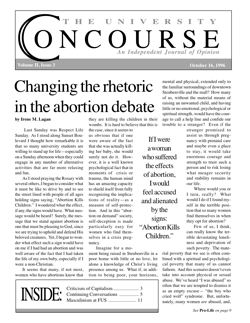Polygamy and secular concepts
by David Bradshaw
A Greek Orthodox friend of mine sent me via e-mail the following response to my article on polygamy, and, thinking it might be of interest, I asked for and received his permission to publish it in the Concourse. K.v.S.
My main question is: why do you rest your argument on “dignity”? In my experience, when someone argues from “human dignity” it is generally with the aim of undermining some traditional practice or belief. Most often there lurks in the background—though the person mounting the argument may be only dimly aware of it—the Kantian vision of man as an autonomous being subject to no law save that which he rationally chooses. Thus homosexual love must be respected because not to do so is to impugn the dignity of the homosexual; the right to abort must be respected because not to do so is to impugn the dignity of women; etc. In fact, the very notion that “choice” is some kind of absolute value derives from this conception of human dignity.
Christians, of course, see man’s dignity as due to his being made in the image of God, and real freedom as conformity to His will. So there is a Christian as well as a Kantian conception of human dignity. But the two are so readily confused and so intimately linked in the popular mind that it is very dangerous simply to appeal to “dignity” without specifying what you mean. You are liable to be be taken as speaking the lingo and appealing to the assumptions of the enemies of the Faith.
In the present case, it seems to me that there is a much better route to the end you propose. This is the teaching of Our Lord on divorce (Mt 19 and Mk 10). He grounds the entire question of the nature and purpose of marriage on the creation account in Genesis, and though he does not directly address polygamy, there can be little doubt that it would fall under the same type of ban as that against divorce. I was greatly surprised that you did not refer to this fundamental passage. Your reason, I suppose, was that you are arguing about the content of “natural law” as against “the positive moral law of the Church.” But doesn’t this very case show how specious that opposition is? Here we have the Creator himself explaining the purpose and boundaries of human nature; how could what he says possibly not belong to natural law?
You seem to share with your opponents the assumption that natural law can be determined by looking at the present state of nature. Against this, I would urge that “nature” in its primary sense is what the Creator intended, and that the real dimensions of human nature are even now most clearly revealed in the lives of the saints. To look at fallen nature as a guide to natural law will inevitably mislead. I fear that your attempt to give a purely “natural” argument against polygamy also leads you into factual errors, or at least into painting with too broad a brush. You write:
“Polygamy degrades woman unspeakably because, rather than treating her as man’s companion, equal in dignity and therefore worthy of his entire self, it subordinates her to him, making her one among the many objects of his pleasure and subjects of his dominion.”
This is quite a sweeping claim! How do you know that it is true? If you were speaking only of harems I might be inclined to agree, but of course there are many other types of polygamous arrangement. Not long ago I read in the newspaper an interview with a dissident Mormon family composed (as I recall) of one husband and two wives. All three were adamant in defending their way of life against a charge of much the type that you make here. Now I do not assume that they were right; they might be self-deceived or fail to understand what a real companionate marriage is like. On the other hand, I hesitate to assume that they were wrong. People have very different conceptions of what companionship and dignity really are, and an arrangement that satisfies some will be found objectionable by others. Here again, our fallen nature deceives us, and we must turn to the Creator in order to discover who we really are. Only then will we know whether our feelings of dignity and worth are really well-founded or are mere self-deception.
To put my argument in a nutshell, it seems to me that the dichotomy of natural vs. revealed law is a misleading one, and that to attempt to flesh out the content of “natural” law by appealing to a vague and largely secular notion of dignity only compounds the error. What do you think?
David Bradshaw
Dr. Bradshaw is a Lecturer in Philosophy at Indiana University Northwest.


